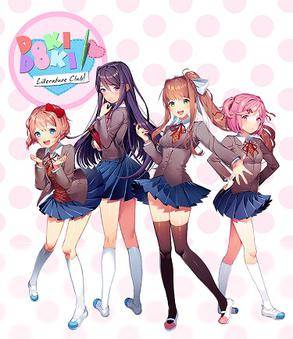Doki Doki Literature Club (DDLC) was released in 2017 by American game studio Team Salvato. Through its cheery marketing and design, it presents itself as a typical dating sim. However, in actuality it subverts expectations through its dark and critical horror narrative that begins to blur the boundaries between real life and the game. Analyzing the game through a feminist lens, reveals a layered critique of traditional dating sims and the problematic portrayals of women within them.
In conventional dating sims, female characters are often one-dimensional and exist solely to be romantically pursued by the male protagonist. Doki Doki Literature Club starts by adhering to these norms, with characters embodying familiar archetypes like the shy bookworm or the energetic childhood friend. The design is also that of a typical Japanese visual novel and takes place in a Japanese high school setting. However, the game soon reveals a deeper narrative where these characters are aware of their roles and the artificiality of their existence. Monika, side character and the club president of the literature club, becomes self-aware and understands that she and the other girls are trapped within a game designed to please the player. Her response—manipulating and eventually killing the other characters—can be seen as a critique of the limited roles assigned to women in such games and genres. Monika’s actions highlight the extreme measures one might take when confined to oppressive and reductive roles.
Further, the game also exaggerates the theme of girl-on-girl misogyny often present in media, where women are pitted against each other for male attention. Monika’s actions are an intensified representation of this trope, illustrating the toxic competition fostered by the structure of dating sims.
Despite the many interesting and innovative ways that Doki Doki Literature Club interacts with the genre of dating simulators from a fresh and feminist standpoint, there are several aspects that I felt were lacking or could have had more nuance within the game, the first being its limited interaction with themes of intersectionality. As previously mentioned, the game heavily follows tropes established in the visual novel dating sim genre, including having a monolithic cast of love interests without much diversity. While this could in fact be an intentional limitation, meant to model the ways in which only some women’s perspectives are taken into account or are portrayed as figures to be loved, I feel it looks a bit of dimensionality and depth to avoid such a conversation.
Additionally, the characters that are present still aren’t as fully fleshed out as they could be, even accounting for the intervention of the antagonist and central character, Monika. Although the game criticizes the two-dimensional portrayal of women, the female characters themselves are not given much opportunity to develop beyond their initial archetypes before being manipulated or eliminated. Allowing these characters more depth and autonomy could strengthen the feminist critique overall. This is something that was addressed partially with the release of DLC in the years following its successful release, but not something I had the opportunity to play with as I completed this critical play, and something I noted sorely wishing I had as I got to the final scenes. Finally, I wish the game had gone further in examining the player’s role and responsibility in perpetuating these stereotypes. More interactive elements that force the player to confront their complicity could make the game’s message more impactful.
In conclusion, Doki Doki Literature Club effectively uses its subversive narrative to critique the superficial and reductive portrayal of women in traditional dating sims. Through Monika’s self-awareness and subsequent rebellion, the game highlights the damaging effects of confining female characters to one-dimensional roles. While the game succeeds in its feminist critique, it falls short in areas such as intersectionality and the depth of its characters.
Discussion question: How is the player complicit in the handling of the female characters in DDLC? What point is the game trying to say with regards to the player’s agency, or lack thereof?



